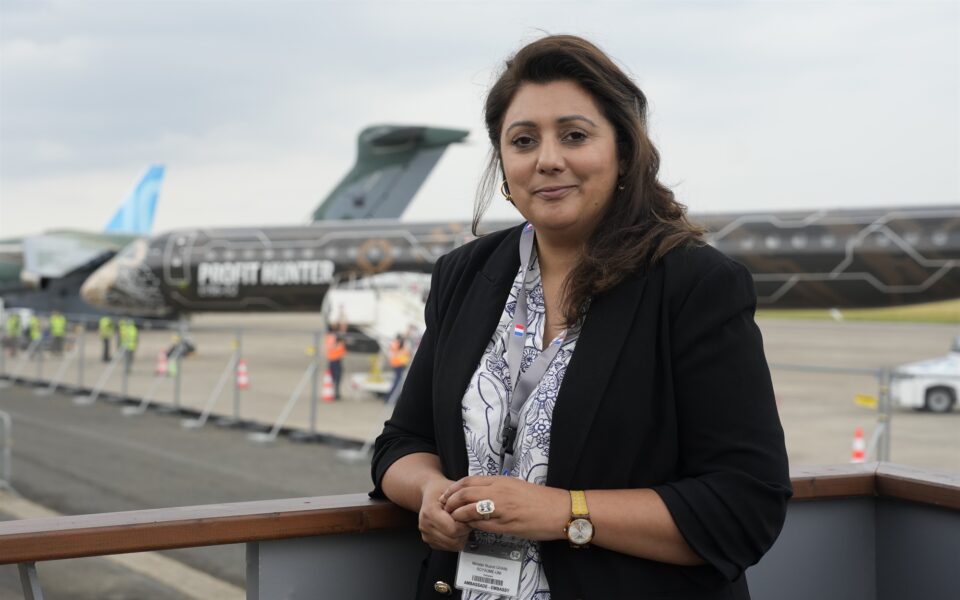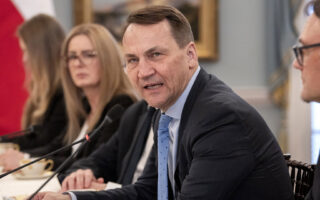Seizing the opportunity for a Cyprus deal
UK Minister of State for Europe reiterates London’s commitment to UN-led peace efforts

The existing parameters of the United Nations are flexible enough to facilitate a settlement to the Cyprus dispute that addresses the priorities of both sides on the ethnically split Mediterranean island, Nusrat Ghani, the UK’s minister of state for Europe, says. Ghani spoke to Kathimerini on the sidelines of the Delphi Economic Forum.
Greece and the UK have sorted out a lot of their pending issues connected with Brexit through a somewhat institutional framework. The two countries have a long-standing bilateral relationship in a lot of fields, nonetheless I must say that sometimes we feel that more could be done. Have you engaged with your Greek interlocutors in sectors where the UK and Greece could be closer partners?
I’ve seen firsthand during my time in Athens and Delphi that the relationship between the UK and Greece is indeed long-standing and important. Two years after signature, the UK-Greece Strategic Bilateral Framework is advancing substantive collaboration across defense and security, education, tourism, and trade and investment. While in Athens I have had productive conversations with counterparts in the Greek government to look at how we can deepen our cooperation, with a particular focus on Ukraine, defense exports, migration, and regional security.
‘While the EU plays an important role in defense and security, it should not replicate the focus, structure and expertise of NATO’
At the upcoming Ukraine Recovery Conference there will be a lot of discussion about how Ukraine will be rebuilt. Isn’t the discussion about recovery and reconstruction of Ukraine a bit premature? Shouldn’t the focus be elsewhere when it comes to Ukraine?
Winning the peace is a long-term project and cannot wait until the end of conflict. Taking action on early recovery, before the end of the conflict, is essential for spurring economic growth, in order to reduce Ukraine’s dependency on international assistance, and for laying the foundations for Euro-Atlantic integration. We are supporting the country to “build back better,” and not simply to restore it to its pre-war state. Ensuring Ukraine’s fiscal, humanitarian and recovery needs are met is as much a part of sustaining Ukraine’s war effort as tanks and materiel. It forms a core part of our long-term commitment to Ukraine. We must take a two-pronged approach to recovery and reconstruction, providing immediate support for Ukraine’s economy and essential infrastructure, alongside our longer-term commitment to help Ukraine emerge from this war secure, prosperous and free.
There is a possibility of a new UN-led process regarding the Cyprus issue. Nonetheless Turkey and the Turkish Cypriots are discussing a quite different framework, away from the bizonal, bicommunal federation, toward something closer to a two-state solution. Is the change of framework a possibility?
The UK remains committed to supporting UN efforts to reach a Cyprus settlement. We continue to believe that the existing UN parameters are flexible enough to facilitate an agreement which addresses the priorities of both sides. Ultimately, it is for the two sides to decide on the details of any settlement. The appointment of the UN secretary-general’s personal envoy on Cyprus is an important step, and I was pleased to learn of her visits to Athens and London. We stand ready to support her as she seeks to identify common ground between the sides. We are encouraging all parties to seize this opportunity for progress.
The UK is a partner of both the US and, of course, bilaterally all major EU actors. Of course, NATO is the defense umbrella of Europe, but would you see a different setting of cooperation with the EU, especially when it comes to defense?
As key NATO allies we are unequivocal: European allies should do more and take greater responsibility for its security. We remain committed to NATO as the bedrock of our collective security. While the EU plays an important role in defense and security, it should not replicate the focus, structure and expertise of NATO. UK-EU relations are in a positive place, and we are driving good results in the areas where we want them. The UK has steadily increased defense engagement with the EU, for example – working together to provide training and military equipment to Ukraine. Our focus is therefore on the substance of our informal cooperation with the EU, and ensuring that it delivers on our interests. Ukraine is just one example of this successful informal cooperation.





